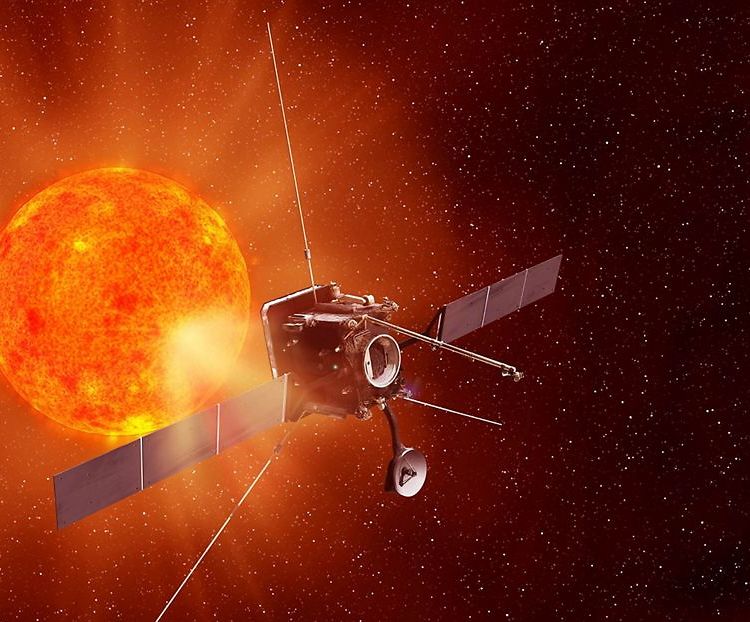Teamwork makes the dream work. Nowhere is this more true than in the space sector. With space missions being highly complex, close collaboration with a wide range of stakeholders is essential to ultimately ensure their success.
Our Space Accelerator programme is designed to help emerging companies by giving them a boost on their journey to space. They can directly benefit from the extensive space heritage and technical expertise of Airbus, the largest space company in Europe and the UK’s major sovereign space company. The 2024 cohort is now underway and we take this opportunity to introduce some of the participants. What are they up to?
Driving innovation in spacecraft propulsion
Propellants and mobility restraints are a major cost driver in the space sector. Accordingly, this is a key area for innovation. One company tackling this subject is Applied Atomics. It is working on a propulsion system that uses one of the most ubiquitous resources in the universe as a fuel: water.
“Today, either chemical or electric propulsion is used in space,” explains Ashley Johnson, Founder and CEO of Applied Atomics. "Electric propulsion is extremely efficient, using small amounts of fuel, but provides very little thrust. Chemical propulsion, on the other hand, is extremely high thrust but uses a lot of fuel, which makes it expensive.”
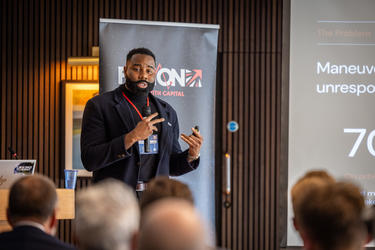
Ashley Johnson is Founder and CEO of Applied Atomics and works on a propulsion system that uses water as fuel. ©Applied Atomics
Applied Atomics is working to combine both types of propulsion in one system. The unifying element is water: "On the chemical side, we split the water into hydrogen and oxygen to create a powerful rocket burn. On the electrical side, we create a water plasma that is ionised and then ejected very quickly by electromagnetic fields.”
With this two-in-one-approach, Applied Atomics aims to make it easier to get around in space. "Currently, it is often cheaper to travel from Earth to space than to manoeuvre within space itself," Johnson says. Going forward, his company envisions a rapid-response network that provides satellite imagery, telecommunications or weather information on-demand – all based on vehicles that are able to move quickly in space and refuel in orbit using water.
"We are thrilled to be part of the Airbus UK Space Accelerator and look forward to making progress, both in terms of the technology and commercialisation of our product."
Ashley Johnson, Founder and CEO, Applied Atomics
Working with Airbus as part of the accelerator programme, Johnson and his team expect to make progress on both a technical and business level: "We want to raise the maturity of our hardware and software, and we also hope to get support in commercialising our products.”
Fighting cancer with drugs made in space
Dr Katie King is convinced that microgravity environments will open up a wealth of new possibilities for space-based applications – we just have to tap into them. A year ago, she founded BioOrbit to pursue an ambitious plan with her team: to build factories in space that crystallise the antibodies needed to treat cancer on Earth.
"Monoclonal antibodies, which are used to fight cancer, are very difficult to crystallise on Earth," Dr King explains. "From research we know that microgravity can facilitate the crystallisation process." With fewer physical forces involved, the quality of the crystals can be improved, which in turn can lead to improvements in drug formulation. Cancer drugs based on antibodies from space are easier to administer: "Patients can inject these drugs themselves at home, rather than having to go to a clinic to receive the drugs intravenously. This gives them autonomy and improves their quality of life".
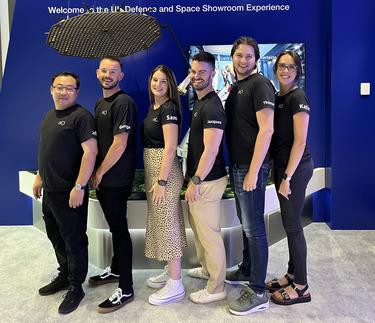
Dr Katie King (first from the right) and her team at BioOrbit are looking to crystallise the antibodies needed to cancer treatments in space.©BioOrbit
Based on these findings, BioOrbit now aims to take space-based antibody crystallisation from theory to commercial scale. The company envisages a time when space stations will carry its crystallisation hardware as they orbit the Earth before the finished product is sent back. "The means of getting payloads into space and back to Earth are evolving rapidly, and with it the costs are coming down as well," Dr King says.
“Through the Airbus UK Space Accelerator we are aiming to consolidate the design for the payload that we will be launching in February 2025. Counting on the support of Airbus in this endeavour is priceless to us.”
Dr Katie King, Founder and CEO, BioOrbit
But there is still some way to go before antibodies can be crystallised on a large scale in microgravity. To prove the feasibility of its plan, BioOrbit aims to send a demonstrator to the ISS in February 2025. This is where Airbus comes in: as part of the Space Accelerator, BioOrbit will receive support to finalise the design of its payload for the first launch in the young company's history.
Bringing quantum technology to the space sector
Recent years have seen a surge of interest in quantum technology, which aims to harness the behaviour of atomic particles. As companies explore how to exploit its potential in their products, Aquark Technologies has joined in on the conversation. The company aims to take quantum technology out of the laboratory and into industrial applications.
Aquark's focal point is the cold matter platform – a system that uses lasers to cool down atoms to temperatures close to absolute zero (-273.15°C), making them usable for quantum applications. “Today, these devices are typically somewhere between the size of a room and a washing machine,” says Dr Andrei Dragomir, Co-Founder and CEO of Aquark Technologies. The company aims to shrink the device to the size of a credit card, making it more accessible.
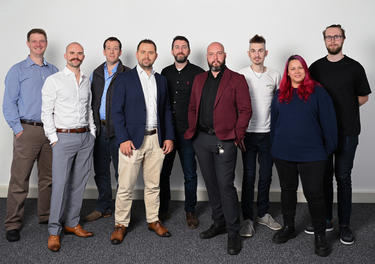
Dr Andrei Dragomir with the Aquark Technologies team © Aquark Technologies
But Dr Dragomir and his team are not just trying to make the device smaller: “We want to establish a platform to produce cold-atom devices on a large scale, extending the reach of quantum technology and laying the foundation for a wide range of use cases.”
"Using cold atoms is like working with a very precise ruler," Dr Dragomir explains. "You can measure things like time, gravity or acceleration very accurately." How can this be applied in space? For instance, quantum sensors could be used for inertial navigation. They would accurately measure acceleration and rotation to ensure that a rocket stays on course or satellites stay in the right orbit. Another application could be in geophysical monitoring. This would allow for a detailed observation of gravitational, magnetic and electric fields. "These are just two of several areas that could benefit from even more accurate measurements than we are able to take today," Dr Dragomir concludes.
“The Airbus UK Space Accelerator jumpstarts our journey into space and provides us with invaluable insights into market opportunities in this exciting sector.”
Dr Andrei Dragomir, Co-Founder and CEO, Aquark Technologies
What else will quantum technology facilitate in the future? Through the Airbus Space Accelerator, Aquark aims to explore this question further. “Quantum technology is still in its infancy and we don't know what applications will emerge,” Dr Dragomir says. “As part of the programme, we want to gain a better understanding of the transformative impact it can have on the space sector. The support from Airbus allows us to gain invaluable insights into possible applications and market opportunities.”
Discover more Space news
Continue Reading
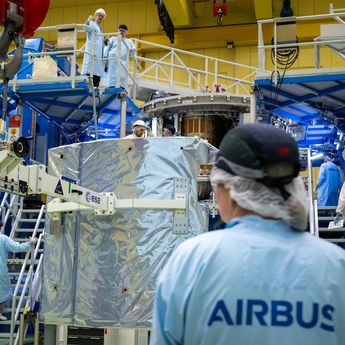
Airbus ships fourth European Service Module for Artemis IV
Press Release
Space
Fourth European Service Module (ESM-4) is ready to leave Airbus’ facilities in Bremen, Germany, and be shipped to NASA’s Kennedy Space Center, Florida, USA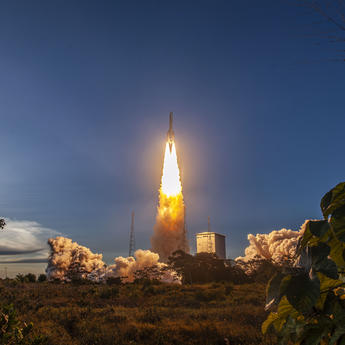
Sentinel-1D: the radar that never sleeps
Web Story
Space
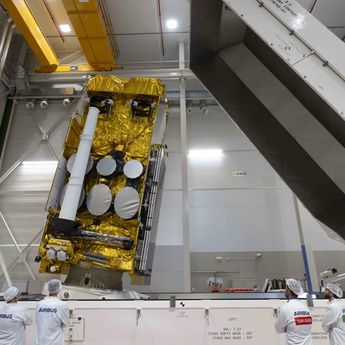
Airbus-built SpainSat NG-II secure communications satellite successfully launched
Press Release
Space

Airbus, Leonardo and Thales sign Memorandum of Understanding to create a leading…
Press Release
Company

Tracking air pollution from space
Web Story
Space
